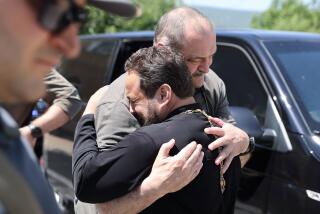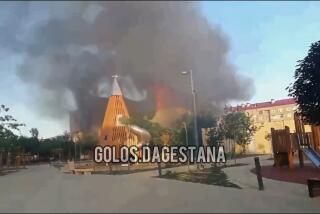Bombing in Ingushetia Injures Prime Minister, Kills Bodyguard
- Share via
MOSCOW — The prime minister of the southern Russian republic of Ingushetia was injured Thursday and his bodyguard killed in a brazen midday bombing, the latest in a widening wave of violence in the northern Caucasus.
The two homemade bombs that exploded within moments of each other were the second major attack this week in the city of Nazran, the commercial center of the increasingly troubled republic that borders the war-torn republic of Chechnya.
On Monday, a 48-year-old Ingush man died and two police officers were injured when a remote-controlled bomb was detonated as the car carrying the officers passed.
Authorities say they believe the increasingly frequent attacks against pro-Moscow government authorities in the Caucasus are the work of Islamic militants whose tactics, support networks and funding sources stretch well beyond Russia.
“We have become convinced that this is an entire network of terrorist organizations, which gets both moral and financial support from many nations,” Nikolai Shepel, the deputy prosecutor general for the Caucasus region, said in a recent interview before Thursday’s attack.
“This is a whole interconnected network of events,” he said. “Over the course of our investigation, we have discovered an underground network.
“We have collected hundreds of thousands of cartridges, rounds of ammunition, homemade explosives ready to go off, several thousand grenades. Various devices for radio-controlled explosions, detonators -- thousands of them. The planting of a Wahhabi [fundamentalist Islam] network is being actively pursued all over the North Caucasus.”
Three more police officers were killed and several were wounded Saturday in an attack in Dagestan, the Russian republic east of Chechnya that has become the scene of almost daily bombings and shootings targeting authorities. Police also believe those attacks have been organized by Islamic militants working across the troubled North Caucasus region, where several republics have majority Muslim populations.
An electric train bound for Makhachkala, the Dagestani capital, was blown up Monday, killing one woman and injuring five people.
In the latest attack, Ingush Prime Minister Ibrahim Malsagov, 44, sustained a serious leg injury as he was driving to his office after lunch. The bomb, which killed his bodyguard, exploded after Malsagov’s three-car motorcade had come to an abrupt halt because of a smaller explosion in front of the lead vehicle.
Anti-government militants “have the aim of widening the zone of conflict from Chechen territory into the territory of Ingushetia,” Ingush regional assembly Chairman Makhmud Sakalov told the Itar-Tass news agency. “They don’t like the path taken by the republic’s leadership toward stability.”
In an earlier interview with Echo of Moscow radio, Chechen politician Umar Dzhabrailov, a member of Russia’s upper house of parliament, the Federation Council, warned against a continuation of the status quo in the Caucasus and urged officials to put the Chechen war behind them and promote economic development in the region.
“Based on all indicators, Dagestan has moved beyond the situation that existed at the beginning of the so-called Chechen war,” Dzhabrailov said.
He said he had also received “worrying signals” of ethnic conflict from the nearby republic of Kabardino-Balkaria. “Today or tomorrow we could see a war between the two nationalities” in the region, he said.
In Nazran, a bustling town that lies next to the smaller Magas, the Ingush capital, police have identified close organizational links between Islamic militant cells operating in Ingushetia and those from neighboring Chechnya. Chechen rebel leader Shamil Basayev directed a series of attacks against several Ingush government buildings in June 2004 that targeted government employees and police officers, killing 88 people.
Militants who participated in that attack were among those who then seized more than 1,100 hostages at a school in yet another Caucasian republic, North Ossetia, last Sept. 1. More than 330 hostages and police officers died in the subsequent explosions and gunfire.
Authorities said Thursday’s bombings in Ingushetia showed careful planning and similarities to two other attacks in the republic over the last 10 days.
“Some forces cannot reconcile themselves with their failure to escalate the conflict, and they oppose the course of creating peace and security,” Ingush President Murat Zyazikov told the Interfax news agency. “They want chaos, but all their efforts are doomed.”
More to Read
Sign up for Essential California
The most important California stories and recommendations in your inbox every morning.
You may occasionally receive promotional content from the Los Angeles Times.










